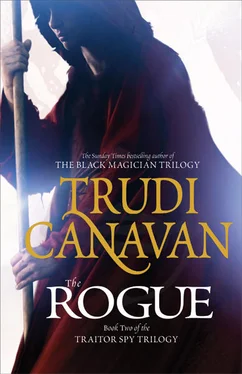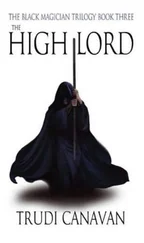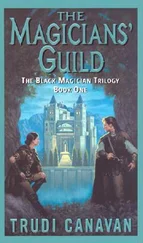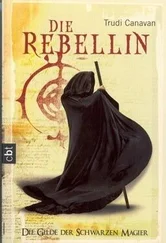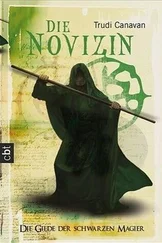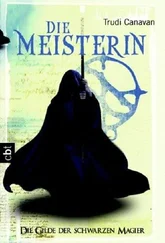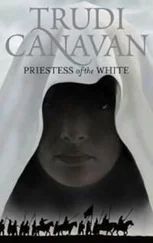Still, it does highlight why some people here believe the Traitors must eventually leave Sanctuary.
He looked around the room. Walls glistened with crystalline points of reflected light. No longer were these outcrops a colourful mystery to him. He knew what each patch was destined to be – which magical task it was being trained to do.
Two kinds were made: patterned and powered. The patterned stones had merely been imprinted with a way to shape magic. The user sent magic into the stone, and it shaped that power into something physical: force, heat, light and various familiar combinations. The intensity of the output was controlled by how much magic was put into the stone. This was what magicians did when they channelled magic out of themselves, so the patterned stones were of not much use to a magician unless he or she hadn’t learned how to do a particular task yet, or could not do it well. They were also of no use to a non-magician, since they couldn’t channel power out of themselves, and had very little or no power to channel anyway.
It didn’t take me long to work out how useful it would be to train gemstones to Heal, so I imagine it’s already occurred to a few Traitors. But there seems to be a limit to the complexity of the task a stone can be trained to do, so if any Healing stones were made they’d only be able to perform basic tasks.
The second type of stone – the powered ones – were far more useful to a magician. They were taught to do the same sorts of tasks, but in addition the maker infused them with their own store of magic. However, this magic was depleted with use. If well made, stones could be re-infused. Less successful stones were single-use. Sometimes they were made to be single-use deliberately, if what they were used for destroyed them, but the majority of powered stones were meant to be re-infused.
Which is so similar to the way the Guild keeps the Arena, and any magically strengthened buildings, strong. The buildings lose magic very slowly, but the Arena and the barrier around it is occasionally battered during Warrior lessons and practice, and has to be strengthened constantly.
The two kinds of magic – the strengthening of buildings and stone-making – were so similar that Lorkin was amazed the Guild had never stumbled on the latter before, until it occurred to him that there were no caves full of naturally occurring gemstones in Kyralia. Neither could they work with imported stones, since by the time these reached the hands of magicians, as jewellery, they were too old to be imprinted effectively.
The other impediment was that the architect who had invented the method of strengthening stone with magic had lived during an era when black magic was banned. Lorkin felt a chill as he remembered how easily and quickly he’d grasped the ideas behind black magic. In less than an hour he’d broken his vows as a magician and a centuries-old taboo.
And for all that, it’s been a bit of a disappointment. I haven’t got any stronger. It hasn’t given me any new skills. All it’s done is enable me to more easily understand and apply the process of stone-making – which will be of limited knowledge to the Guild unless they manage to find some gemstone caves in Kyralia, or work out how to create them another way.
Learning black magic had given him a more realistic view of the magic within him, and his own strengths and vulnerabilities. He suspected it was possible to raise a stone to perform a task without knowing black magic, but it would have been like working blind – impossible to tell if he was getting it right, how much magic the stone could hold, or when it was ready to use.
He looked down at the small green gemstone in his hands. For most of the process, he’d had to work with it while it was still attached to the wall, and a few times he’d lost it among the masses of stones there. When he’d established enough of an imprint upon it, he’d been able to remove it and refine its training at a table.
Long periods of unwavering focus were required. He understood, now, why Tyvara had said she didn’t have the patience for stone-making. Speaker Halana had also told him that making stones that produced heat or explosive force could be dangerous, if the maker’s concentration broke, too much magic was stored in it or the stone was flawed. That was why some stone-making was done in remote caves, where entry was forbidden except by the invitation of the stone-maker who worked there.
Lorkin was making a light-producing stone. Though it was more difficult, he was also being taught how to infuse it with magic. It was also more dangerous because a learning stone-maker could easily infuse it with too much power, or lose concentration. He could have been given a duplication stone to use. These could create endless copies of the pattern held inside them – particularly stones to be trained in complicated magic. Speaker Halana, however, insisted that all students first learn how to create a stone without the help of duplication stones, so that they did not come to rely on them too much.
The vibration had stopped now. Lorkin glanced around the room. The other stone-makers had returned to their work, heads bent over tables. He drew in a deep breath and started a mind-calming exercise. He did not know if the Traitors had similar exercises, but the simple ones he’d been taught at the University were coming in very handy now.
As he was about to send his mind out to the stone again, he heard his name murmured. He looked up. Speaker Halana was walking toward him.
“How is it going, Lorkin?” she asked as she reached his table.
“Good, Speaker Halana,” he replied. “Well, nothing has gone wrong yet.”
She smiled crookedly, with a now-familiar dark humour, and picked up the stone. All but the newest stone-makers had a similar fatalistic humour, he’d noted. Though accidents were rare, they did happen. Lorkin had seen some badly scarred women making their way through the caves. Once, one of the newer makers had whispered to him that some of them worked alone not just to avoid dangerous distractions, but because they preferred that others didn’t see their scars. Some of them ate, slept and worked in the inner caves permanently, almost never leaving.
After staring at the stone intently, Halana put it down again. “You’re doing well,” she said. “It’s a little better than most first stones. In a few days we should be able to activate it.”
He smiled. “And then?”
She met his eyes and paused, then shrugged. “Then you’ll move on to bigger tasks. I’ll check on you again tomorrow.”
With that, she turned away and moved on to the next student. Lorkin watched her, wondering at the pause after his question. It was almost as if the question had surprised her, and she’d assumed that he had known already.
Perhaps she hadn’t thought that far ahead. Or she’s not used to students wanting to know what they’ll be learning next. Or the answer is rather obvious.
Shrugging, he turned back to the stone and, as he was growing quite skilled at doing, resolved to think about it later.
With a little magic, Lilia gently warmed the water in the bucket. She dared not heat it too much in case other servants noticed it steaming, realised that Lilia hadn’t gone to the kitchen to heat it, and started to wonder about her. Kneeling on the floor, she dipped a cloth in the water and began to wipe and scrub.
For a week Lilia had been living in the bolhouse, sleeping under the stairs and pretending to be a cleaner. Donia had been surprised when Lilia had suggested the disguise, until she learned that Lilia’s family were servants. Anyi had disappeared after the first dinner, and when she reappeared the next morning she’d been angry to find Lilia scrubbing pots in the kitchen. Lilia had needed to talk her out of telling Donia off.
Читать дальше
